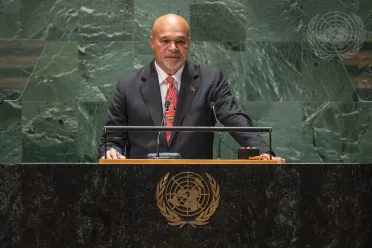Statement
Statement summary
JOHN ROSSO, Deputy Prime Minister of Papua New Guinea, voiced concern over compounded crises such as climate change, the socioeconomic and supply-chain adverse impacts of the war against Ukraine and the financial and economic burdens arising from the existing unfair and archaic international financial system. “Mere rhetoric talkfest and hollow-sounding promises are what we must avoid,” he asserted, declaring: “Let us use this opportunity to ensure that we put in place concrete, result-oriented and workable ways and means that will help support effective, timely and sustained delivery of the basic needs of our citizens and the development aspirations of our countries while protecting our environment.”
Detailing his Government’s pragmatic leadership to address Papua New Guinea’s development challenges in critical areas such as economic growth, health services, education, law and justice sector, he pointed to the new five-year (2023-2027) Medium-Term Development Plan Four. This national development plan, together with the country’s overall long-term Vision 2050 strategic development road map will enable Papua New Guinea to become an upper middle-income country by 2030 and to improve its human development index global ranking by 2050. His Government has prioritized health, as a core national development agenda, he said, underlining its commitment to universal health coverage by focusing on people and their environment, engaging with social partners and increasing access to quality and affordable health services. Major health challenges remain in the prevention and control of communicable and non-communicable diseases, and in reproductive, maternal, newborn and child health.
Financing for development remains a serious challenge for developing countries, he continued, highlighting the growing divide between countries that can access affordable financing for development and those that cannot. In this context, he strongly supported the call by the Secretary-General for a $500 billion annual Sustainable Development Goals Stimulus to support developing countries. If realized, accessing such funding support to developing States should be at speed and scale and less onerous. Papua New Guinea needs $26 billion in the next five years to grow its national economy and reach its development aspiration of $57 billion-per-year economy. According to the international financial system, the country is rated to be at a high-debt risk. Accordingly, his Government is taking ownership of domestic resource mobilization through measures such as tax reforms and enhanced internal revenue collection, strengthening governance laws and policies to tide illicit financial flows, addressing systemic issues on foreign exchange and incentivizing public-private partnership. He strongly supported the Bridgetown Initiative as a part of the reform of the global financial system to improve the response to the climate crisis and development challenges such as access to affordable financing and debt relief.
Turning to the climate crisis, he sounded alarm over natural disasters, droughts, sea-level rise and food insecurity, as well as their impact on his country’s economy. Citing climate change as a “the single greatest existential threat” to the lives and livelihoods of Pacific Islanders, he underscored the urgency to limit global warming to 1.5 degrees Celsius through rapid reductions in greenhouse gas emissions. “This is critical to the survival of small island nations,” he said, highlighting national progress on the climate change front, including the political commitments to use his country’s marine and terrestrial natural resources to address climate change. At the Pacific regional level, he urged the international community to contribute to the Pacific Resilience Facility, a regional financing facility set up to address disasters and climate change threats in the Pacific continent, also commending the adoption of the new global treaty on the conservation and sustainable use of marine biological diversity of areas beyond natural jurisdiction.
Full statement
Read the full statement, in PDF format.
Photo

Previous sessions
Access the statements from previous sessions.
